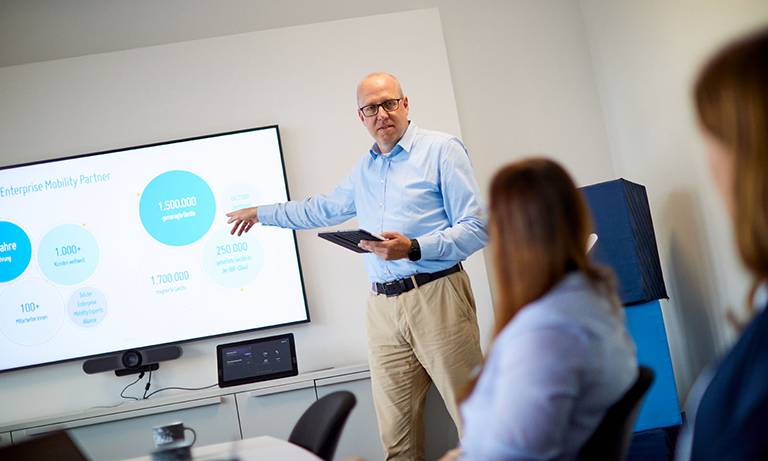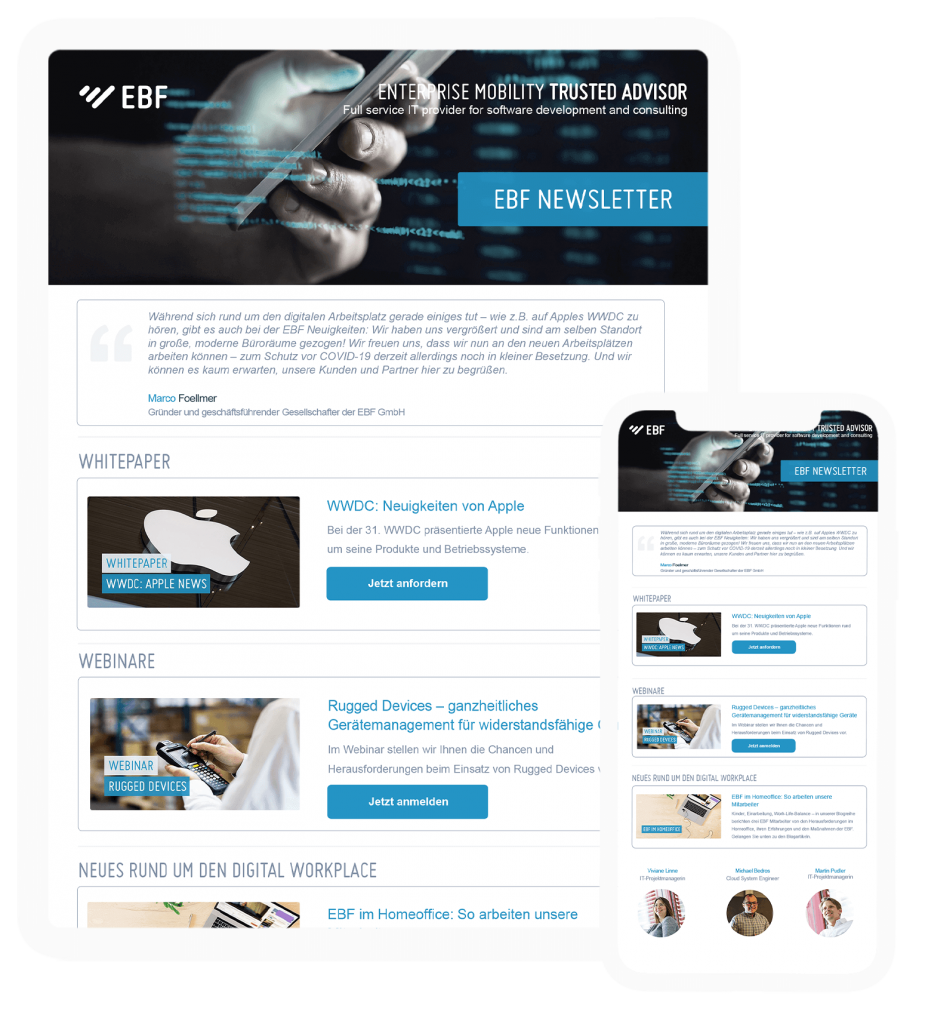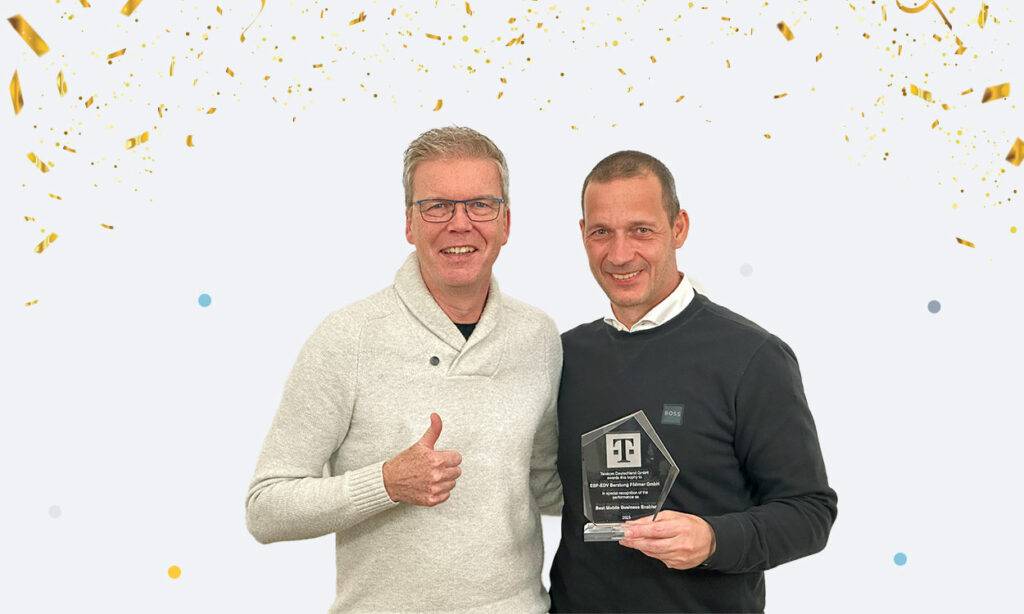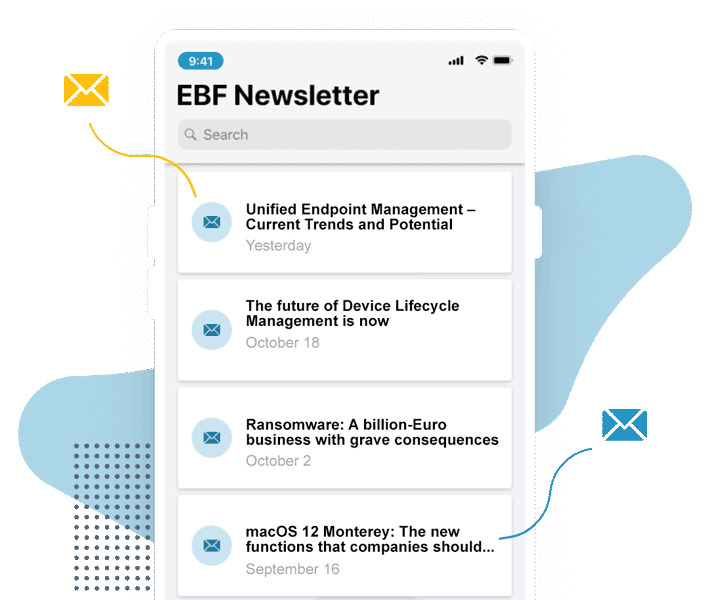Efficient device management, high security and a great user experience – the possibilities offered by a UEM system sound promising. However, first of all, it is not easy to get an overview of all the options. And once it is clear what should be implemented, the next big question mark usually arises during implementation. This is because there are many details involved.
Especially when switching to a new system, there is a lot to learn. And the continuous development of platforms and operating systems also bring constant changes and new possibilities.
We know all these details inside out – and have now created a training program to pass on our knowledge and, above all, our experience. This currently includes a practice-oriented intensive training for Microsoft Intune and one for the Ivanti EPMM.
Find out in an interview with our trainers Robert Hamel and Dennis Wittig what the training courses are about, why our offer differs from many others and why a lot of theory is useless if you don’t know how to put it into practice.
What are the training courses about and who are they aimed at?

In the training courses, we first talk about the basics of Unified Endpoint Management and then in detail about the basics of Microsoft Intune and Ivanti EPMM. We introduce the participants to the respective UEM system and highlight all core aspects so that the administrators are then able to handle the systems independently. We focus on iOS and Android, but we also touch on Windows and macOS.
The basic idea is that we pick up administrators who are starting from scratch as well as administrators who have already gained some experience – in the system or in another system that is now being replaced by a new system. No specific knowledge is required.

Exactly, the offer is actually relevant for several target groups. The training enables administrators who are preparing for the introduction of a new solution to directly know how to initially set up the system according to the requirements when the solution is implemented. Administrators who have already worked with the system can refresh their knowledge, gain a deeper understanding of the system and try out things that they may not have time for in their day-to-day work, that they don’t dare to do or that they don’t even know exist. They will see what they can do even better. Both Microsoft Intune and the Ivanti EPMM are very comprehensive and offer many possibilities and hidden options. If I haven’t read the manual from cover to cover, I probably don’t know many of the options. 😉
Does it matter whether I have to manage 100 or 10,000 devices?

No, the knowledge we impart is suitable for many. Most of the topics are just as relevant for administrators with 100 devices as they are for those with 10,000 devices.
To a certain extent, we will also cover infrastructure topics that are more interesting for larger environments with large numbers of devices. However, this will be on a more theoretical basis and will not be the focus – otherwise it could quickly go beyond the scope.
Another topic that is particularly challenging with large numbers of devices will also be addressed: We will talk about how to ensure that planned changes also work in bulk and not just for a small test group.
How do you teach the content?

The training courses are scheduled for 4 days and take place in small groups with a maximum of 12 participants on site in Cologne.
We have developed a catalog of content that we can cover in the training courses. At the beginning of the training, we start with basic topics that we consider essential, which you should know and have tried out. In consultation with the group, we will then define further topics from the catalog that we want to look at in more detail. This could be the topic of Conditional Access or Mobile Thread Defense, for example. This content will then be looked at in more detail in some training courses and only touched on in others. This gives us a certain degree of flexibility and allows us to respond to the needs of the participants.
Another important part of our training courses is that there will be a lot of practical elements. Participants should be able to test what has been discussed directly in the system and ask questions. There won’t be an exam at the end.

The exam then takes place in everyday working life, so to speak. And we are sure that the participants there will benefit from the training.
Why did we set up a training program?

The idea had been around for a while. Because we keep noticing in companies that there is a need for such training. There is often a lack of practical knowledge in IT departments and many possibilities of the systems used are not even exploited. Examples are Modern Auth or Single Sign-On. We want to create awareness of this.
There are many training providers - what makes our training courses different from many others?

We take a very practical approach and prepare participants not for an exam, but for their day-to-day work. It’s about understanding the system, being able to work with it and transferring what they’ve learned into practice. Participants can experiment with a test system and try out lots of things so that they are able to implement them in the company afterwards.
Our training courses are enriched with our own experience. We don’t simply recite instructions. We teach best practices and share what we have successfully experienced with other customers and what we have learned. The theory can always be acquired in some way – but the practical experience cannot. We bring almost 20 years of experience to the table – and that is something very few companies do, to be honest.
The flexibility we mentioned is also an advantage: we do follow a guideline – but as we said, it’s not a rigid guideline like those found in many training centers. We respond flexibly to the participants’ questions and problems and also teach content that is outside of standardized guidelines. In training courses that end with an exam, everything is geared towards the test questions.
I think that all of this helps the administrators a lot more than other very theoretical training courses. Because what’s the point if I can solve problems in theory but don’t know how to do it in practice?

I would like to add one more thing. We at EBF are in a very special situation: we can offer very focused and practical training courses – tailored to UEM systems and the Modern Workplace. And one of our great advantages is that we don’t just know one UEM system, we have five in our portfolio. This means that we know the differences very well, look at the products and their possibilities from a completely different perspective and can make comparisons and provide overarching improvements. There aren’t many who can do that.
Are you looking forward to the first training course? What do you expect from it?

I’m very excited about the participants, their questions, and the group dynamics. I hope that we can pick up on it well and make the whole thing enjoyable.

I also have to say that I really want to do this and respond to people. Trainings are part of our everyday consulting work. But these training courses are something different. At the end of the week, I would like to hear people say: “I really enjoyed that. I learned a lot.”
Thank you very much for your interview, Dennis and Robert. We wish you successful training weeks and all participants a good time with the two of you and lots of valuable insights!
Find out more about our current training programs
Become an expert not only in theory, but also in practice and experience great added value in your day-to-day work thanks to our know-how and experience.
If you have any questions about our program, please contact us at moc.f1714251141be@ne1714251141gnulu1714251141hcs1714251141 or call 0221 474 55 145.












